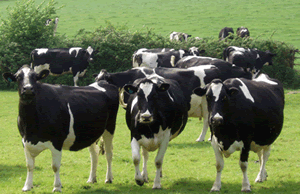
by Fergus Cullen
Originally published in the Hartford Courant
They say sacred cows make the best hamburger, so here goes: To save Connecticut’s dairy industry, we need to slaughter cattle instead of subsidizing farmers.
Dairy farmers are hurting. The federally mandated price of milk has dropped 40 percent since last June. Today it costs Connecticut farmers about $1.90 to produce a gallon of milk they can only sell for a dollar.
The dairy industry has turned to the General Assembly – meaning to consumers and taxpayers – for a bailout, twice trotting a spokescow named Daisy to the Capitol as a black and white public relations prop. The farmers are lining up at the taxpayer trough, asking for income tax credits to insulate them against low commodity prices and an increase in licensing fees for retailers that sell milk.
Why has the price of milk collapsed? As with all commodities, price is a function of supply and demand. The market is flooded with milk, so prices have fallen. When manufacturers deal with oversupply, they can cut production easily by slowing or shutting down assembly lines. Not so easy to do with cows, which need to be milked twice a day. The way to cut milk production is to turn some dairy cows into beef. We need fewer cows and, yes, fewer dairy farms.
The unfortunate truth is that dairy is a dying industry in Connecticut and has been for decades. In 1940, there were more than 6,000 Connecticut dairy farms. Today there are only 157 left, most of them small operations with fewer than 100 cows that don’t benefit from economies of scale.
Connecticut has about 19,000 dairy cows. For comparison, Wisconsin has 1.2 million. Milking taxpayers to prop up a dying industry leads only to higher prices for consumers and delays the inevitable.
Everyone likes the idea of dairy farms preserving heritage and open space and providing a locally grown product. But nostalgia for the quaint idea of family farms is no reason to subsidize Farmer Fred’s chosen lifestyle by creaming Taxpayer Terry. Nor do we need the milk we drink to be produced locally any more than we would expect the bananas we eat to be grown in Barkhamsted.
It is not the government’s or taxpayers’ job to protect farmers from financial risk in their chosen line of work. Dairy farmers are small-business owners struggling to get by just like every other small-business owner. They should not get special treatment or special subsidies. Many of us like having maple syrup stands, clam shacks or antique shops around, too, but that doesn’t entitle those small businesses to taxpayer subsidies.
There are free-market solutions to the problem of price fluctuation. Futures and options markets exist for this purpose for other commodities such as soybeans and pork bellies. Other commodities manage risk through insurance programs – not much different from how businesses in other parts of the country might protect themselves by purchasing flood, hurricane, drought or earthquake insurance. Taxpayer subsidies and bailouts only weaken the incentives for dairy farmers to operate efficiently and manage their own risk, and result in higher prices for consumers.
The new subsidies sought by the dairy industry would be on top of existing special treatment, including federal price supports designed to make up the difference between the cost of production and market prices. Milk retailers are already charged a $30 fee for the right to sell milk, a tax farmers are now trying to get increased to as much as $3,000 for large retailers, who will just pass the cost along to consumers. Farmers also receive special exemptions from fuel and sales taxes, and can be eligible for property tax breaks.
A taxpayer-funded report produced earlier this year by two state agencies calls for even more extreme protectionist and anti-free market measures such as establishing a state milk commission empowered to set milk prices instead of leaving it up to the market.
Milk prices fluctuate but subsidies tend to last forever. When prices eventually recover, don’t expect Daisy to go back to the Capitol to tell legislators the latest subsidy is no longer needed. Instead, she’ll moo about how there are even fewer dairy farms left and how yet another, bigger subsidy is needed. This in turn will encourage continued overproduction and drive prices even lower.
Fergus Cullen is director of the Yankee Institute, a Hartford think tank that advocates free-market solutions to public policy issues.

